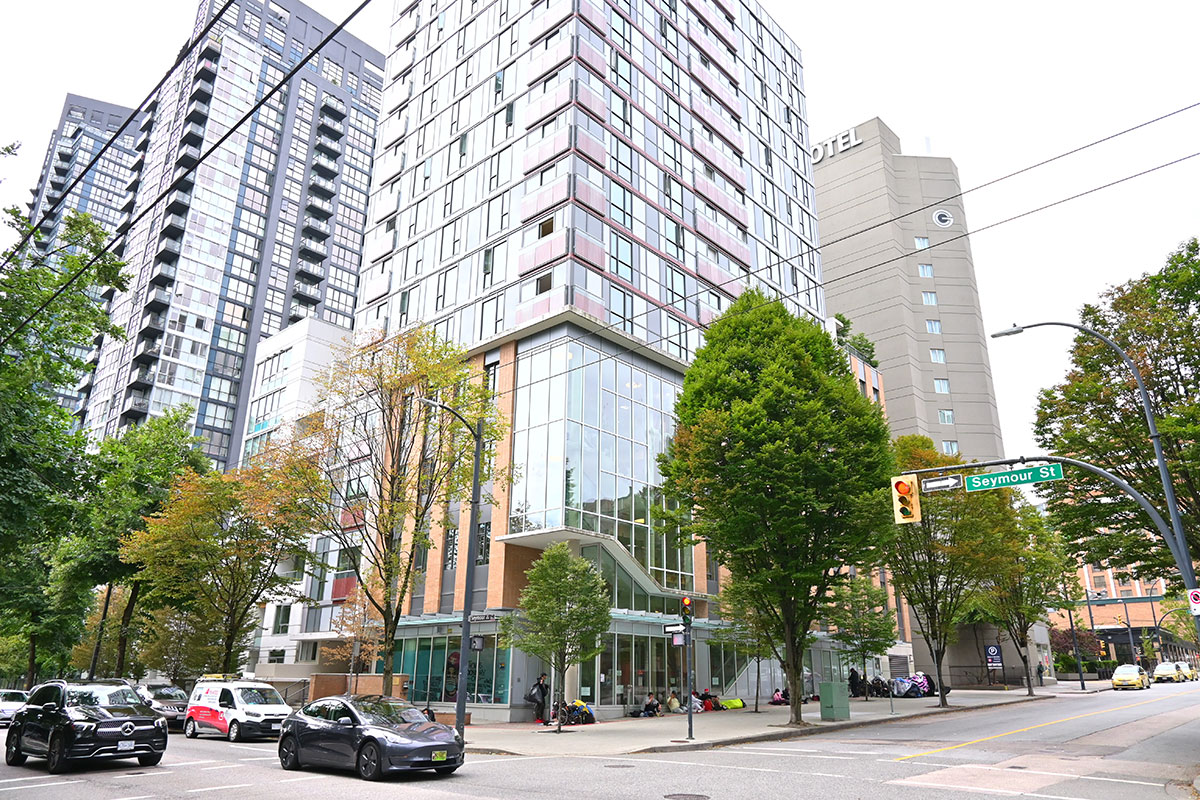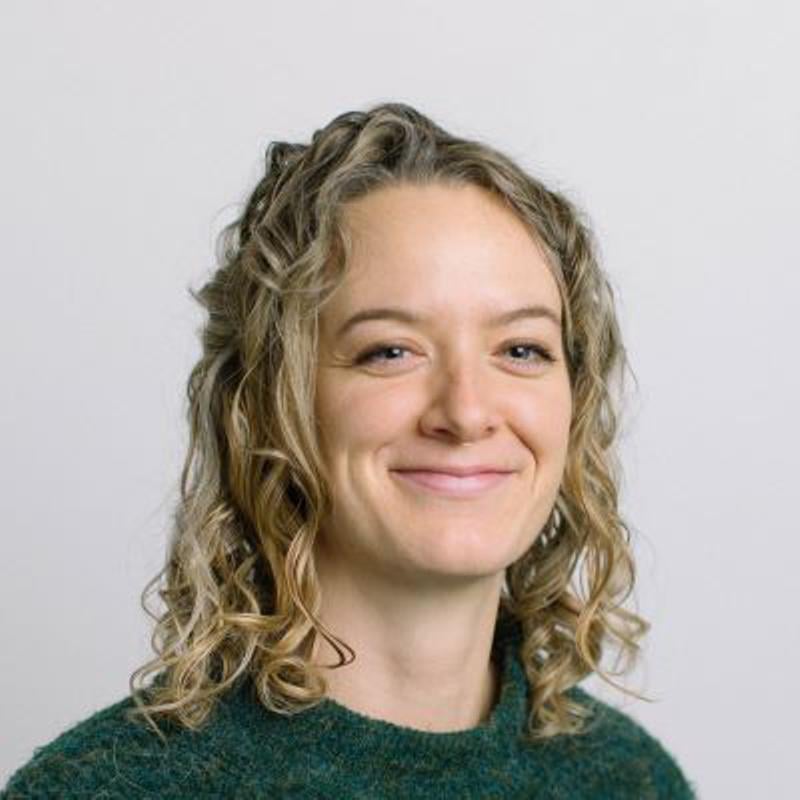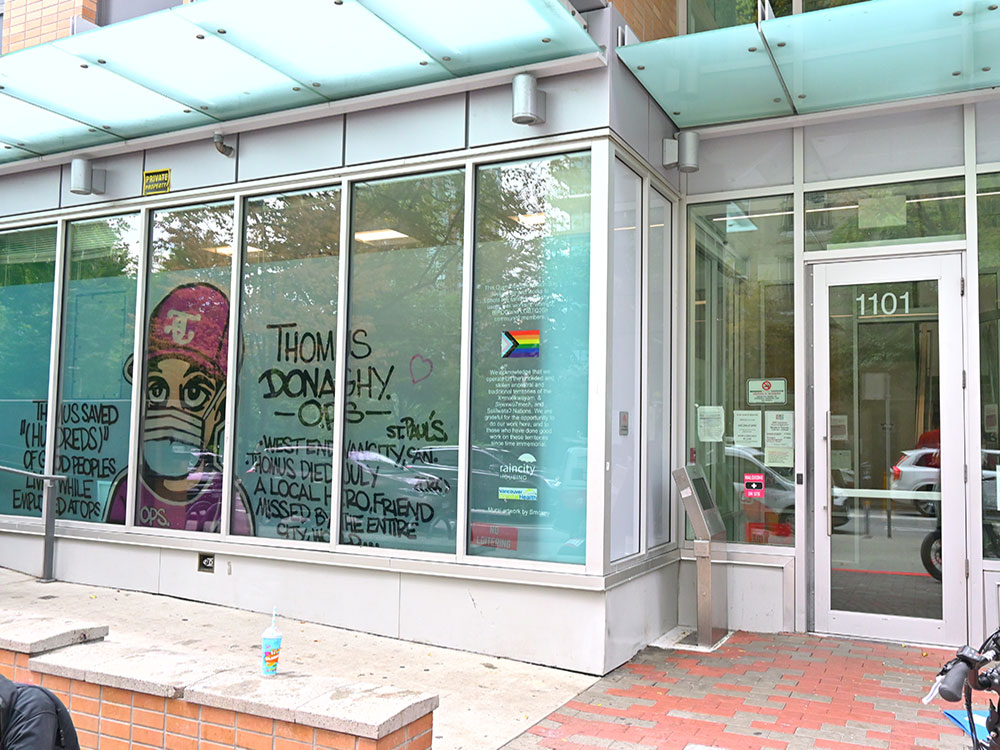On Monday Vancouver Coun. Peter Meiszner took to Twitter to announce the City of Vancouver wouldn’t be renewing the lease of the Thomus Donaghy Overdose Prevention Site.
This overdose prevention site, or OPS, is located in Vancouver’s City Centre neighbourhood at Helmcken and Seymour, just one block from the busy Granville strip. This neighbourhood has the second-highest overdose rate in the city after the Downtown Eastside according to Vancouver Coastal Health. The site is named after Thomus Donaghy, an overdose prevention worker who was killed on the job in 2020.
Dear #Yaletown neighbours: an update on the future of the OPS at Seymour & Helmcken. As many of you know, I have been working—since elected—to ensure the operators take accountability for the negative impacts on our community. City staff have stepped up with additional funds and… pic.twitter.com/FImFxBmtC5
— Peter Meiszner 裴智勵/裴智励 (@PeterMeiszner) July 24, 2023
So far this year in Vancouver there have been 328 toxic drug overdose deaths, or an average of 56 fatalities each month, according to the BC Coroners Service.
Meiszner directed his tweet to his “#Yaletown neighbours” and said he’d been working “since elected” to make “operators take accountability for the negative impacts on our community.”
He also said harm reduction “must come with appropriate wraparound services.”
In April this year Meiszner also said he did “not support closing the site without an alternative location.”
Just so we are clear, I do not support closing the site without an alternative location. But we have to find a way to manage the impact on the neighbourhood, it's untenable.
— Peter Meiszner 裴智勵/裴智励 (@PeterMeiszner) April 26, 2023
The Tyee requested interviews with Meiszner and Mayor Ken Sim, both members of the ABC party. Conor Doherty, Vancouver operations co-ordinator, told The Tyee the decision not to renew the lease was an “operational decision made by city staff and not council” and that further questions should be directed to Meiszner, who did not respond to media requests.
OneCity Coun. Christine Boyle told The Tyee that Vancouver city council “needs to play a role” to ensure that neighbourhood has access to “life-saving services.”
Vancouver Coastal Health told The Tyee it is already looking for an alternative site nearby because “supervised consumption services are needed to support the community here.”
The health authority says it is “disappointed” Vancouver will not renew the current OPS lease, which has been run in partnership with Raincity Housing since 2021.
Raincity did not respond to an interview request by press time.
“VCH has an obligation to care for the health of all residents in our region. In the time it’s been open, this OPS has saved many lives and connected people at risk of overdose to essential health-care supports and services,” the health authority said in a statement.
OneCity has launched a petition to keep the site functional until a new location can be opened. Boyle says this petition received 500 signatures during its first 24 hours.
“I’m worried about certain councillors saying no to proposed sites,” she says. “There’s a real lack of commitment from council in supporting life-saving services.”
Because ABC councillors hold a “super majority” on council they have the ability to vote together and block any future proposed OPS sites, she adds.
Guy Felicella, a peer clinical advisor with the BC Centre on Substance Use, says Meiszner seems to be criticizing the OPS for larger societal issues.
“He’s blaming the OPS for negative things caused by a bunch of different factors like the city’s decampment of the DTES, the toxic drug supply, crime, homelessness because of the un-affordability crisis, crime and public safety in the area,” he says. “Its job is to meet people where they’re at so they don’t overdose and die when they use alone.”
People who use drugs are easy scapegoats for politicians to point fingers at rather than working to address more complicated, slow-moving solutions like tackling the housing crisis, he says.

Both Felicella and Sarah Blyth, executive director of the Overdose Prevention Society, which is separate from the Thomus Donaghy OPS, say Meiszner’s tweet calling for “wraparound services” shows a lack of understanding about what happens at an OPS.
“Wraparound services already exist in those facilities. What the hell do you think they do there, Peter?” Felicella said.
When people come to an OPS they are supervised while they use drugs so that someone can intervene and immediately call 911 if they overdose, says Blyth. But there are also services to test and treat people for Hepatitis C, connect people with treatment, housing, jobs and counselling. There are even haircuts and telephones people can use to call their families.
If city councillors try to block Vancouver Coastal Health from opening a new OPS in the neighbourhood, the health authority will likely just roll their mobile OPS van into the neighbourhood, Felicella says. The van was parked in the neighbourhood for nine months before the facility opened in 2021, he adds.
The current facility is “imperfect” but it is saving lives, Boyle says. She knows the place is small, and that there’s nowhere for people to line up to access services or sit and rest after. There’s also a lack of space for people to publicly gather, she adds.
Vancouver Coastal Health says it received complaints from neighbours and worked with Raincity Housing to address neighbour concerns, including hosting a quarterly tenants’ meeting with the City of Vancouver to understand and address neighbour feedback, organizing a regular needle sweep that also picked up litter, and conducting ongoing conversation with the city, police and other organizations and residents in the area.
Boyle and Felicella are hoping that a new, larger location can be found.
Felicella says the city should take one of its parking lots and build a facility that supports supervised injection and inhalation drug use.
The BC Coroners Service says around 70 per cent of this year’s overdose fatalities for all of B.C. happened after someone smoked or inhaled a substance. More than 80 per cent of the province’s overdose fatalities happened indoors, with half of those deaths happening in a private residence.
The B.C. government declared a public health emergency due to toxic drug deaths in April 2016. Since then, 12,509 British Columbians have overdosed after accessing the toxic drug supply.
It’s “outrageous” to close an OPS in the middle of this crisis, Felicella says.
“It only takes a few minutes for people to die once they’ve started overdosing,” Blyth says.
“We elect people to work on these difficult issues so they can find solutions,” she says.
“Life saving shouldn’t be political — but it’s become political because of the stigma. Politicians should be helping. This is a life or death facility and it needs to operate.” ![]()
Read more: Health, Rights + Justice, Municipal Politics

















Tyee Commenting Guidelines
Comments that violate guidelines risk being deleted, and violations may result in a temporary or permanent user ban. Maintain the spirit of good conversation to stay in the discussion and be patient with moderators. Comments are reviewed regularly but not in real time.
Do:
Do not: